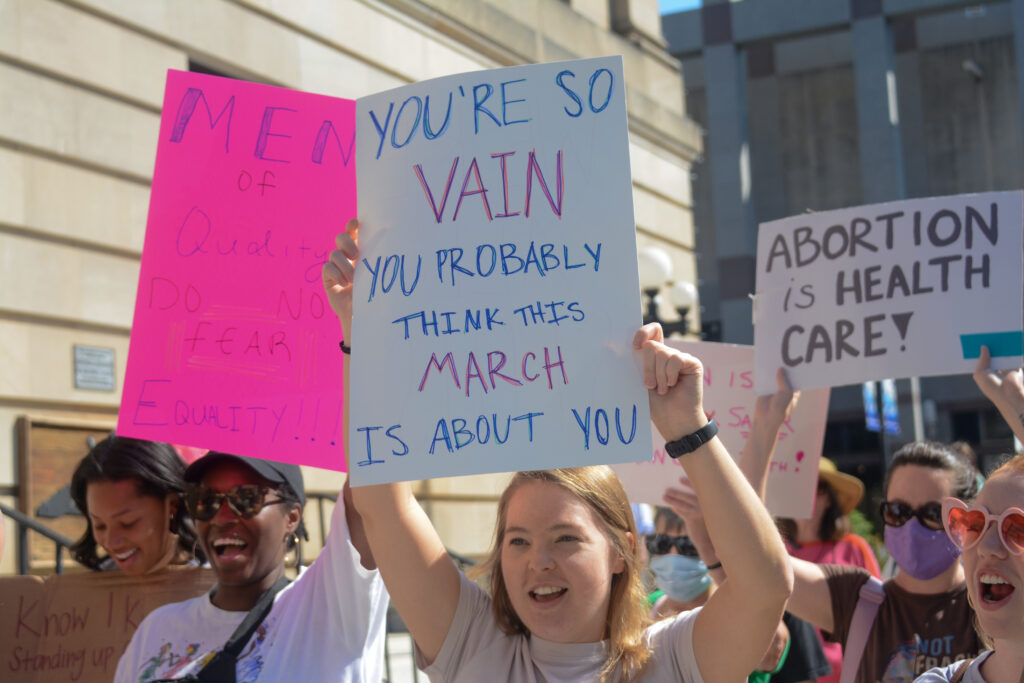
Photo by Emily Peedin
By Audrey Javan
Our university is lucky to sit in North Carolina’s capital, just under 10 minutes away from the General Assembly building. Of course, I hadn’t been in Raleigh on the morning of the Veto Rally for Health Care Freedom, so the drive was closer to 40 minutes, but the point still stands. Students here have the opportunity to witness and participate in government the way not many other college students in the state can. It’s hard to tell how many people there were part of the Wolfpack, but regardless, the spirit could be felt throughout the crowd of protestors.
The crowd around the podium was massive, packed with so many adults, children and dogs that I couldn’t see where it ended. Many wielded signs that proclaimed “ABORTION IS HEALTHCARE” on a hot pink background, while others were emblazoned with messages exhorting politicians to stay out of medical spaces, or comparing the annual death tolls due to gun violence versus abortion. There were a few people — including the state director of the nonprofit Care in Action — weaving through the crowd handing out Plan B emergency contraceptives to anyone who wanted them, as well as educating people about how and when to use them, and where to find them for affordable prices.
Everyone had come together that day to support Governor Roy Cooper’s veto of Senate Bill 20, a 47-page bill that plans to do several things, most infamously to ban abortion after 12 weeks of pregnancy. There are many caveats to this ban — including an extension to 20 weeks when the pregnancy is due to rape or incest — and many stipulations on things such as consultation appointments and waiting periods before being allowed to schedule an abortion with a physician. In essence, this is probably not the most aggressive abortion ban that we’ve seen in the country among all of the bills passed so quickly after the overturning of Roe v. Wade. At least, it appears to be kinder on its surface. However, rally attendees like Dr. Katherine Farris, chief medical officer of Planned Parenthood South Atlantic, think that it’s still a dangerously unjust infringement.
“Abortion is part of the full range of reproductive health care that we may all need at some point in our lives. Whether it’s birth control, pregnancy care, miscarriage management or abortion, we all deserve to access these services without interference from politicians,” Dr. Farris said. “There’s mounting evidence that abortion bans lead to substandard medical care and higher rates of maternal and infant mortality. And that’s unacceptable. And that’s because abortion bans are bad medicine.”
The president of Planned Parenthood Alexis McGill Johnson elaborated, saying that it’s not just the medical bans that negatively affect those seeking care, but the crushing stigma as well. It’s a stigma she described as “toxic” and “judgemental,” one that fuels shameful silence in care-seekers and fury in those who wish to block them from care. Many worry that the passing of this bill will only worsen that stigma. Tina Marshall, founder of the Black Abortion Defense League (whose acronym BADL is pronounced like “battle”), is a clinic defender who has experienced this first hand over the past two and a half years, witnessing protestors outside abortion clinics scream at patients through megaphones and try to block their cars.
Marshall, among other speakers, also expressed empathy for patients who will be forced to travel far outside their communities multiple times in order to seek reproductive care if this bill is passed. Many will have to take time off of work for multiple days and travel long distances multiple times over in order to make it to consultations and appointments, trips they might not be able to afford. And that’s all after they have to hunt to find a clinic or physician they trust to administer care, if they’re one of the millions of North Carolinians who live in rural areas.
“Since last summer, I’ve seen more people arrive very tired after driving for nine hours or more to get to a clinic,” Marshall said. “We know that the majority of people who have an abortion already have kids at home, and many of the patients I see have children with them when they arrive for their appointment. And y’all, some patients are children themselves.”
Marshall brings up an important point: not only does SB-20 not make any exceptions for pregnant minors, effectively overlooking children who get pregnant, it also makes no mention of transgender people who may also become pregnant. The only type of person they define at the very beginning of the bill is a woman, defined as “a female human, whether or not she is an adult.” This makes no mention of transgender men who have fully-functioning uteruses or of AFAB nonbinary people, both of which could have the ability to become pregnant and need an abortion. Does this law not apply to them? Or does it overwrite their status as trans individuals? The erasure of trans people is present in both discussions of abortion and reproductive care and in the law, both of which must be addressed if we’re going to have true equity in this space.
Finally, Governor Cooper took the stage. Every line he spoke sparked raucous cheers from those gathered. Cries of “Damn right!” and “Yup!” from the people around me splatter my recording. Even though many couldn’t see him clearly through the trees and the people standing tall on planters, there wasn’t a soul in the plaza who wasn’t listening. Governor Cooper echoed what the others had said earlier:
“This bill has nothing to do with making women safer, and everything to do with banning abortion. There is a reason why the North Carolina Medical Society, the OBGYN Society, the North Carolina Academy of Family Physicians all oppose this bill!” he said. “How about, leave the medicine to the doctors and the decisions to the women?”
Right at the podium, backed by loud chants of “Roy” and “veto,” he read and signed the veto message, gave it the veto stamp and signed underneath the stamp to officially veto SB-20.
As we know presently, as of May 15, that veto has been overturned. It’s not about getting the bill stopped, now, but about working around it and pushing back on it. The next election season, make sure to get out and vote for the politicians that will represent you in this fight. Consider voting out the senators who promised to protect reproductive freedom and went back on it. Even the governor’s seat is up for grabs again in 2024.
The Wolfpack has a direct view to the state’s capitol; we sit in the embrace of its influence, a stone’s throw away. That proximity is a reminder of how involved we are meant to be in our state’s politics, how much we can change if we start making our presence known.
As Attorney General Josh Stein said, “This is a fight for our freedoms! Let’s get to work.”
